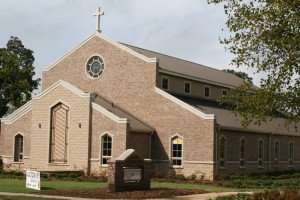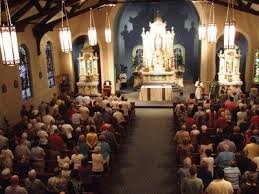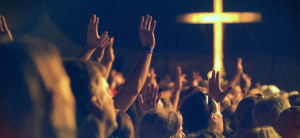The other day was the three-year anniversary of my entering the Church. And as I’ve been helping dear ones through their own conversions this year, it occurs to me that once again, I’ve left my own conversion story hanging. Here is another chapter.
The first week I moved to Oxford, Mississippi, for graduate school, I visited the Catholic Church. I guess I was thinking of Audrey and the other people I had met when I visited, and hoping to make some kind of social connection. I was desperately afraid that unless I quickly formed some kind of support system in this new town and university, I would not be able to cut it in grad school.
My thinking on the purpose of the church at that time was that it existed solely as a community for the support of the fellowship of believers. So that is exactly what I was looking for the first time I attended Mass at St. John’s in Oxford: for social connection; for fellowship with people like me who could support me and encourage me. And I couldn’t have been more disappointed and discouraged.
I went to the eleven o’clock Mass on what I later learned was one of the busiest Sundays of the year, the Sunday of move-in week, when the families of all the undergraduates were in town to get their children settled and off to a good start. The place was packed, standing room only, and I had no idea where to go or what to do. From the beginning, this worked against my social anxiety and my comfort level. I was further dismayed that no one greeted me, in the way I had come to expect as a Protestant. No one seemed to notice I was there. I narrowly squeezed into a seat in one of the back pews.
Several key things stand out in my memory from that visit. First, I thought the priest was goofy. He seemed not entirely put-together, dignified, or solemn as I expected a Catholic priest to be. Second, he was reading the liturgy! I don’t know what I was expecting, but I was deeply bothered by this: Much as many Protestants feel that composed prayers, as opposed to extemporaneous ones, are somehow less real and less genuine, I felt that this priest did not really, sincerely mean or even understand these words he was reading out of a book about God, Jesus, and salvation. Did he even have faith at all, or was this just the “dead religion” I had been fearing for so many years? How does reading prayers out of a book make them applicable to me? How does reading prayers out of a book serve me? It contradicted my whole understanding of what a church service was supposed to be.
Perhaps most important, I didn’t feel anything. I did not feel the presence of God. I did not hold this up as a standard — this focus on my own feelings had defined my existence as an Evangelical, whether and how I felt the presence of God, and I understood this had been a problem for me and one of the main reasons for my searching — but nonetheless it troubled me a lot. It wasn’t that I was closed-minded to any part of the experience; indeed, I had felt God’s presence profoundly when I had been in Catholic churches before. But I wondered that day if God was really there in the Catholic Church at all.
At Communion, I went forward to receive a blessing at the invitation of the priest. I was in the line of a lay extraordinary Eucharistic minister, a female, and I had no idea what I was doing, so I just stood there awkwardly crossing my arms. She seemed impatient and frustrated (I’ve since learned that laypeople really ought not to be giving blessings at all), and I felt unwelcome. I took a visitor card and filled it out, but had a difficult time finding anyone to give it to. I ended up giving it to the same extraordinary minister, who again acted (I imagined) as if she had no idea what I was doing there if I wasn’t Catholic.
I did not see Audrey or anyone else I knew. Not only did no one greet me, but no one really spoke to me at all. I left feeling singularly foreign and unwelcome, disappointed and unfulfilled, and more than a little disheartened and disturbed. What I came looking for — a social community — was nowhere to be found. I had been in denial for a while about my attraction to the Catholic Church, maintaining a ready collection of objections to Catholic doctrine. Now those objections were bolstered, and I added one more. This was a major setback: I would not consider the Catholic Church again until some six months later.




